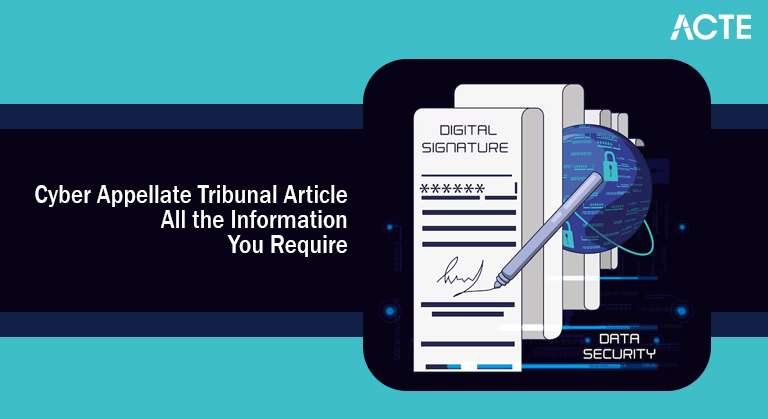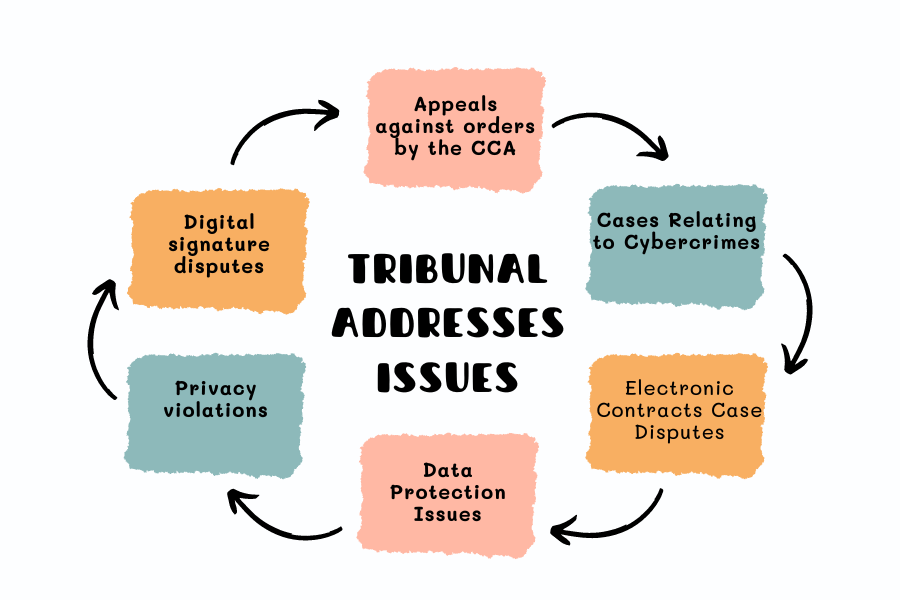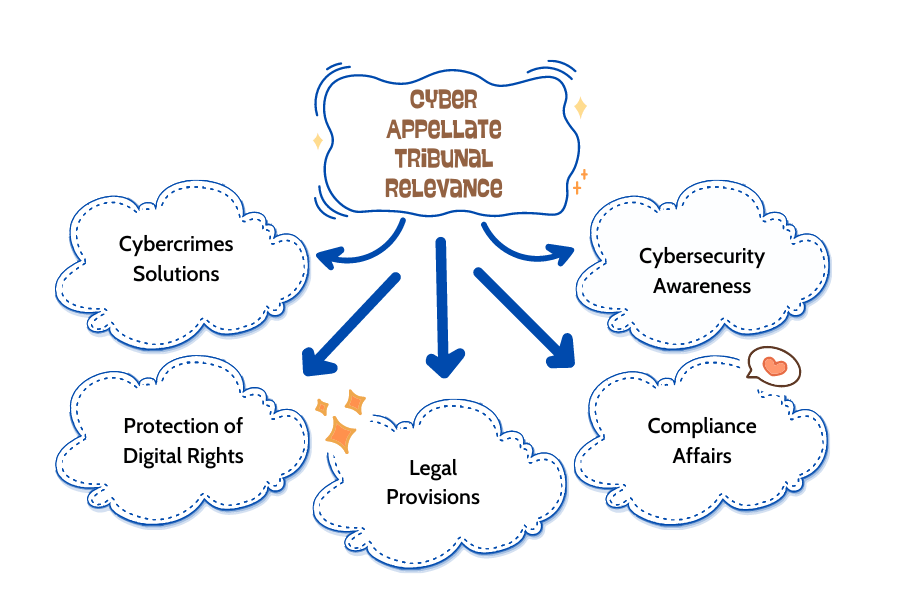
- Introduction
- Understanding the Cyber Appellate Tribunal
- Composition of the Cyber Appellate Tribunal
- Functions of Cyber Appellate Tribunal
- Cyber Appellate Tribunal Relevance
- Challenges Faced by the Cyber Appellate Tribunal
- Conclusion
The Cyber Appellate Tribunal is the specialized judicial body in India that decides disputes and appeals regarding cyber threats, especially those under the Information Technology Act, 2000. Established to deal with this rising need for legal expertise in matters of cyber security law and online governance, the tribunal entertains cases on cybercrimes, data protection, electronic commerce, and digital transactions. Among the various cyber threats addressed by the tribunal, cases involving malicious software like a Keylogger can be brought to light. It provides for appeals from decisions made under the IT Act by the Adjudicating Officer so that the legal architecture stays up-to-date with the pace of growth of the digital world and online activity.
Interested in Obtaining Your Cyber Security Certificate? View The Cyber Security Online Training Offered By ACTE Right Now!
Introduction
Cyber laws are the most relevant among many complexities that emerge in the digital age. At this pace of fast-moving technology, cybercrimes and disputes arise; thus, an apt judicial system is needed to deal with such matters. One body constituted to meet these challenges is the Cyber Appellate Tribunal or CAT. A blog on the Cyber Appellate Tribunal, with its objective, structure, functions, and relevance in the present legal world, shall be discussed in this article. The Cyber Appellate Tribunal (CAT) was established under the Information Technology Act, 2000, to provide an effective and efficient mechanism for the resolution of disputes arising from cybercrimes, data breaches, online fraud, and other digital offenses. As the digital landscape continues to evolve with rapid technological advancements, the need for specialized legal frameworks has become crucial. The Appellate Tribunal can provide an avenue for appeal against decisions by Adjudicating Officers in cyber law violation cases. Of course, it helps the legal machinery adjust according to the complexities of virtual realities and protects the rights of individuals and firms transacting or existing in cyberspace.
Understanding the Cyber Appellate Tribunal
What is a Cyber Appellate Tribunal?
The Information Technology Act of 2000 created the quasi-judicial body responsible for operating the Cyber Appellate Tribunal in Cyber Security Training Courses. This Tribunal primarily appeals to the orders issued by the Controller of Certifying Authorities and other bodies specified for such purposes. This playing field deals with electronic records, digital signatures, and cyber security threats, with its ultimate positioning to deal with dispensations of justice based on digital transactions and communications.
Background and Preliminary
The Internet and digital technologies have thrown new challenges to law enforcement and dispute resolution. A landmark piece of legislation that met some of these challenges was the Information Technology Act of 2000, which provided a legislative framework on issues of electronic governance, digital signatures, and cybercrimes. To effectively deal with all such disputes arising under the Act, the Cyber Appellate Tribunal was established.
To Earn Your Cyber Security Certification, Gain Insights From Leading Cyber Security Experts And Advance Your Career With ACTE’s Cyber Security Online Training Today!
Such issues are dealt with by the Cyber Appellate Tribunal as explained hereunder:
- Appeals against orders by the CCA: Appeals against orders pronounced by the Controller of Certifying Authorities on matters related to the certification of digital signatures will be entertained.
- Cases Relating to Cybercrimes: It adjudicates cases where the aggressor is brought to book, ensuring accountability for cybercrimes and digital offenses.
- Electronic Contracts Case Disputes: The Tribunal would settle disputes resulting from electronic contracts and other agreements. In this context, Cyber Awareness becomes crucial, as individuals and businesses must be educated about the potential risks.
- Data Protection Issues: With data privacy and protection issues, the Tribunal also gets cases for complaints regarding infringement of the law of data privacy.

Composition of the Cyber Appellate Tribunal
Composition
The Cyber Appellate Tribunal is an appointed tribunal with a chairperson and two other members by the central government. The chairperson is a retired High Court Judge. In addition to the legal expertise, the Cyber Media landscape also plays a significant role in shaping public awareness and discourse around the functioning of the Tribunal. However, the other members are understood to have rich experience in the fields of technology, law, or cyber law.
Tenure and Qualification
The members of the Tribunal are appointed for a term that may be at most five years and can be reappointed. The government decides upon the qualifications of the Chairperson and members of the Tribunal so that the Tribunal is manned by people with legal and with legal and technical expertise.
Functions of Cyber Appellate Tribunal
Judicial Opinion on Appeals
The primary role of the Cyber Appellate Tribunal will be to pass judgments on appeals against the CCA orders. It would involve dealing with the facts of the case, hearing legal arguments, and rendering judgments in justice. Pass Judgment on Appeals regarding Orders passed by the CCA. This Tribunal interprets cyber laws and explains the different law provisions by clearing them. Its decision precedes other cases and helps establish a sound legal framework around cyber security law.
Awareness
The Cyber Appellate Tribunal brings to its attention high-profile cases of Cyber Security Training Courses and the consequences of non-compliance, further educating businesses and individuals about their rights and responsibilities in the digital realm.
Partnership with Other Bodies
The Tribunal functions in collaboration with different government agencies, law-enforcing bodies, and international organizations to deal with cybercrime issues more effectively. This collaboration will make the overall legal mechanism more potent and capable of solving problems resulting from cybercrime.
Looking to Master Cybersecurity? Discover the Cyber Security Expert Masters Program Training Course Available at ACTE Now!
Cyber Appellate Tribunal Relevance
Cybercrimes Solutions
In this context, it is urgent to establish a dedicated forum for resolving the growing number of cyber security tools. This specialized judgement should provide justice to the concerned parties within time.
Protection of Digital Rights
Growing electronic transactions have emphasized individual rights and placed them at the forefront. An important task of this Tribunal with legal remedies will be provided to the cybercrime victims and those found to be involved in cyber disputes. In this context, Network Penetration Testing plays a vital role in identifying vulnerabilities within networks that could lead to such disputes or cybercrimes.

Legal Provisions
Cyber Appellate Tribunals are established in the technological and cyber-related legal framework. Decisions made by the Tribunal impact a safer Internet world through the various policies and provisions governing one’s online activity.
Compliance Affairs
Adopting cyber laws and disputes will lead the Tribunal to promote compliance among organizations and people. Thus, it will establish a sense of responsibility on the cyber frontier.
Challenges Faced by the Cyber Appellate Tribunal
Despite all such importance, the Cyber Appellate Tribunal encounters many challenges:
- Awareness and Accessibility: People are generally unaware of its existence and workings. Hence, such limitations restrict easy access to justice.
- Technical Knowledge: Cyber law is specialized and requires technical knowledge. The Tribunal often has trouble understanding the technical aspects of the cases.
- Pendency of Cases: Like other judicial bodies, the Tribunal has a large pendency of cases, which leads to delayed justice. To address the growing complexity and volume of cyber-related disputes, innovative solutions such as a Sandbox Environment can be used.
- The Pacing Technological Advancements: With technology changing fast, laws and regulations lag behind this velocity of change.
Are You Preparing for Cyber Security Jobs? Check Out ACTE’s Cyber Security Interview Questions and Answers to Boost Your Preparation!
Conclusion
The Cyber Appellate Tribunal is a crucial institution in the legal system of India. It raises awareness, defends digital rights, offers rulings on appeals, and offers the essential foundation for issues involving technology and criminality. The digital world is dynamic, and these kinds of institutions will only grow in significance over time. Therefore, individuals, organizations, and legal experts must comprehend the roles and importance of these establishments. In this world increasingly ruled by technology today, information on the Cyber Appellate Tribunal and how it works goes beyond being just helpful toward understanding and keeping abreast of Cyber Security Training Courses and how they happen for digitized justice.





